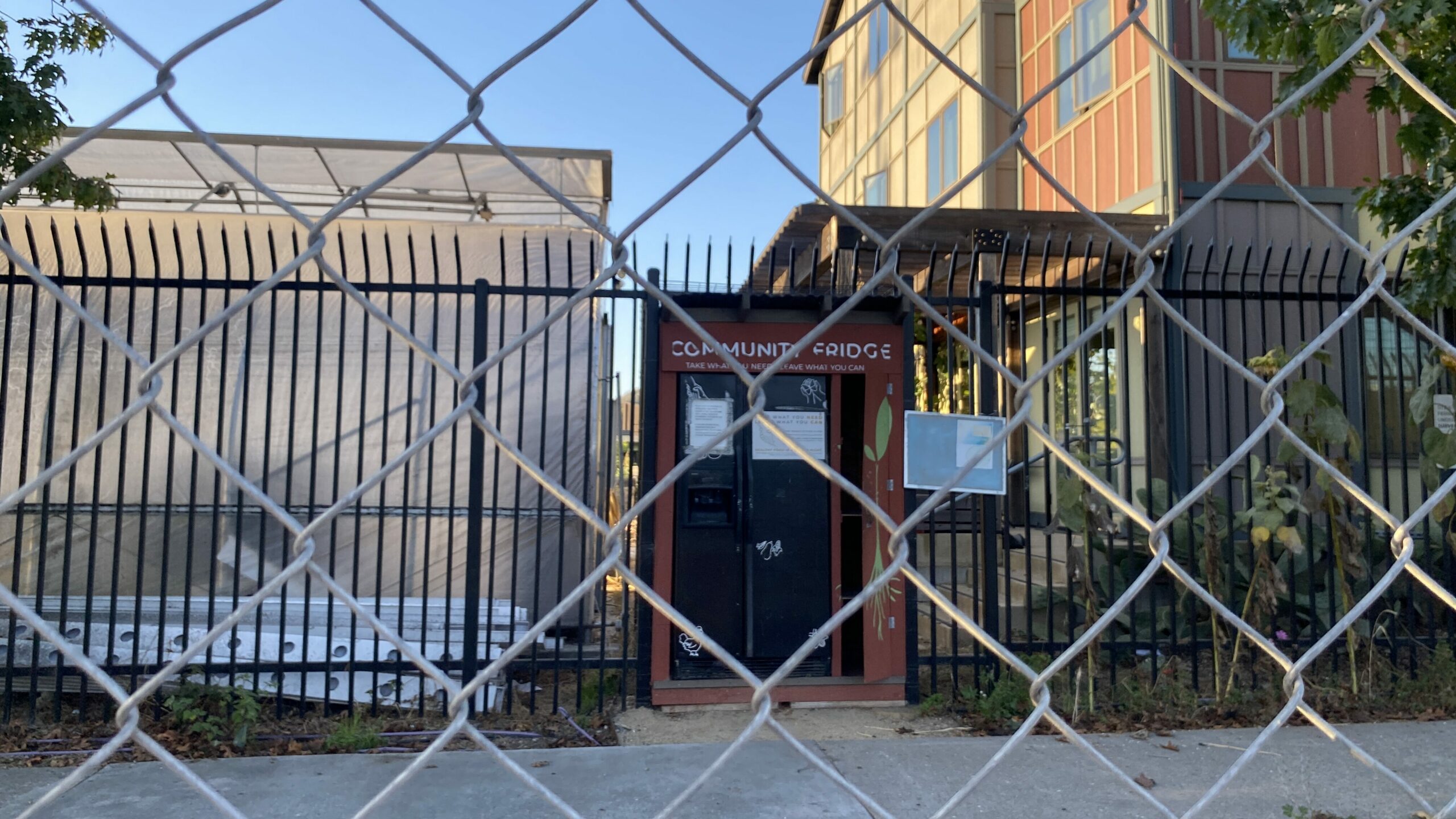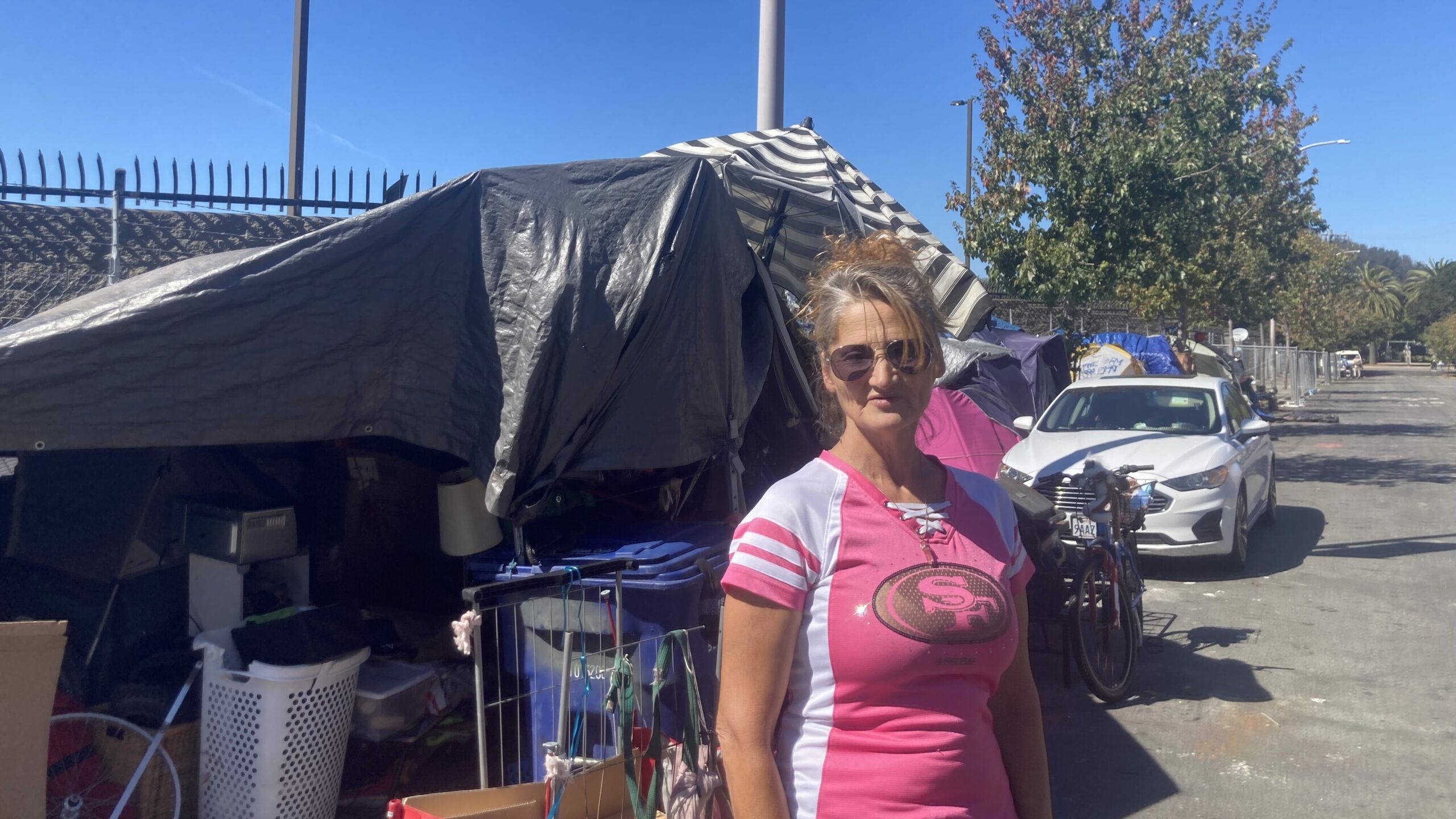
Residents of 8th and Harrison have been organizing after a series of attempts to close the long-standing encampment
“Good morning. Today is August 22nd, 2023. It is 7:59 AM. I’m waiting for the city to come.”
Down on the bank of Codornices Creek, at the border of Albany and West Berkeley, Yesica Prado sat quietly in a tent she had set up the night before. The Berkeley Public Works Department was scheduled to clear the creek of unhoused people in preparation for an upcoming creek restoration project. The creekside area is part of a much larger encampment known as 8th and Harrison, where Prado has been living in her RV since 2018.
Prado knew that her neighbors did not know the sweep was coming, and might lose their belongings or be displaced in the process. In protest, she vowed not to leave the tent unless the City of Berkeley brought out mental health professionals to adequately connect her neighbors to social and medical services before they tried to clear the area.
72 hours earlier, an unhoused neighbor named Jennifer Gerlach passed away behind a dumpster less than a hundred feet from Prado’s nearby vehicle home. Prado helped clean the area, and spent two days sending urgent emails asking the mayor and other city officials to halt the sweep in light of the tragedy. But city officials replied to confirm their intention to move forward with closing the creekside encampment.
The morning of the sweep, Prado hadn’t slept more than three hours after spending all night helping a neighbor move out of the city’s clearance zone. It was 7 o’clock, and she was prepared to be arrested.
This protest was a defining moment in a multi-year long conflict surrounding the 8th and Harrison community, one of Berkeley’s largest remaining encampments. It spans two perpendicular blocks with tents and vehicles densely collected in both directions. It’s a busy area, packed with constant traffic and crowded with shopping carts, beds, clothes, bikes, dogs, trash, art, constant conversation, communal cooking, and collected piles of recycling. It’s people’s homes, all laid out on the sidewalk.

As business and housing developments continue to grow in West Berkeley, so has the stark juxtaposition between the neighborhood’s housed and unhoused residents. 8th and Harrison now finds itself between a graduate student housing complex, a Whole Foods, a Tesla warehouse, and a brewing company. One block up from Prado’s RV you can buy a $7 latte, and one block down you can buy a $7 bagel. In an interview with Street Spirit, a nearby home-and-business-owner said the encampment is bad for business. “Those people need serious help. They’re dirty, and the university and the city won’t do anything about it.”
Peter Radu, the Assistant to the City Manager and head of Berkeley’s Homeless Response Team, described encampment living as “different from sheltered or even unsheltered homelessness…folks in these dangerous and entrenched encampments [are] literally closer to Death’s doorstep.”
Berkeley has created a large record of public health hazards, fire risks, and complaints from nearby businesses and homeowners. Similar tensions are on the rise in communities across California. Growing encampments continue to create a visceral reminder of the sheer volume of people living in poverty in one of the richest states in the country. Nearly half of all unsheltered people in the U.S. live in California, and in Alameda County alone, 73.2% of 9,747 unhoused people are unsheltered, the fourth highest rate in the country. Governor Newsom’s office says it has invested $14.7 billion in solutions to this crisis, yet more than 22,500 people have entered homelessness for the first time since 2020.
Radu says the 8th and Harrison encampment “is not an acceptable new normal. We as a city have a responsibility to go in and manage those conditions…for the sake of the broader community…At what point are we going to maintain some semblance of a social contract?”

Government leaders across California are asking the same question. Gavin Newsom has helped clear encampments himself, and centered much of his housing and homelessness policy on clearance. One of the main initiatives has been the Encampment Resolution Funding Program (ERFP), aimed at awarding small grants to cities to help “resolve dangerous and unsightly encampments.”
The City of Berkeley won two rounds of funding under the ERFP. In July 2023, the second round of funding granted the city $4.9 million, specifically to work with the 8th and Harrison encampment. Berkeley used the money to rent and convert the Super 8 motel on University Avenue into the Campus Motel, a non-congregate and long-term housing program run by Insight Housing, which is funded through 2028. The Campus Motel has 23 rooms, laundry and linen services, bi-weekly cleaning and room checks, and case management resources. Residents have their own key and no curfew, but are not allowed any visitors. As of September 19th, the Campus Motel housed twenty people, including three who are now back on the street.
As the city began their sweep of the camp, they moved people into the Campus Motel, and fenced off a growing number of sections of the encampment. They referred to this process as “resolution.” Public works employees, outreach workers, and police streamed through the camp. For many residents, including Prado, it was a tumultuous time. Residents were uncertain about who would receive housing during the sweep. Before moving into the Campus Motel, individuals were asked to sign “Housing Resource Forms,” which gave the city permission to throw away their remaining possessions once the individual accepted shelter. Many residents found the form misleading, believing their ability to be housed was contingent on signing these forms. It was also unclear if the city’s Good Neighbor Guidelines, which were piloted at 8th and Harrison, were fully established or enforceable.
Trying to get at-risk residents of 8th and Harrison prioritized for housing, Yesica Prado demanded that Berkeley officials recognize Jennifer Gerlach’s death as a sign that the needs of the most vulnerable residents of the Gilman District were being grievously overlooked. In the series of emails she sent the city days before the sweep, she wrote:
“To make it clear, no one is resisting services at 8th and Harrison. Every single person at the camp wants and needs help. I ask you to please halt the construction and take the time to properly connect my neighbors to the social and medical services that they need to recover.”
Radu responded by reminding her of the new Campus Motel, the city’s dumpster services, portable toilets, LifeLong’s medical truck, and Dignity on Wheels’ weekly shower and laundry services. He said, “We have done and are doing literally everything a California city can to serve this encampment, and we really do need the County’s help to take the next step.”
Prado is a graduate of the UC Berkeley Graduate School of Journalism and a reporter at the San Francisco Public Press. She grew up undocumented in the United States and because of this, lacked the financial aid options to support her education. She became unhoused while paying her way through graduate school, and moved into an RV with a group of others who eventually ended up at 8th and Harrison. In her almost six years living at this encampment, Prado has driven people to medical and housing appointments, bought and distributed tents to people in need of shelter, helped disabled residents keep clean, advocated to case workers, documented resident’s stories, organized unsheltered people to attend city council meetings, and represented the encampment in communications with the City of Berkeley. She has also initiated two pro-se lawsuits against the City of Berkeley to defend the constitutional rights of her neighbors.

On August 22, when the city finally came to clear the area, Peter Radu tried to convince Prado to leave the tent. They argued, both holding their ground. Prado responded that she would not end her protest until Berkeley Mental Health was called to conduct on-the-ground assessments of resident’s mental health needs—a city service that does not typically provide on-the-ground support during encampment sweeps.
Ultimately, Prado was granted this wish. At Radu’s request, Berkeley Mental Health closed their daytime drop-in center and drove to 8th and Harrison to pass out water, socks, underwear, first aid kits, and information about how to get connected to their drop-in services. The team left after less than an hour and have not been back to 8th and Harrison since. One encampment resident was cleared that day, and was seen sleeping on the creek a few days later.
In the weeks following, Prado and the East Bay Community Law Center organized residents to file a collective lawsuit against the city in response to its attempts to hold a large sweep after Labor Day—advocates argued that because of the holiday weekend, residents would not have adequate time to access the resources necessary to successfully relocate. The group ultimately won a temporary restraining order, keeping the City of Berkeley from sweeping the encampment while the order was in place. But the judge lifted the order in September, freeing the city to commence the sweep at any time. In the meantime, Prado and others have set up a mutual aid table and legal aid tent to help answer questions and provide case management.
When asked what her goal was, Prado said, “I would just hope that Berkeley Mental Health would actually show up. If I get arrested eventually, I’m not sure if that would even accomplish it. But I just hope that more people with expertise and more patience, you know, are able and willing to build a rapport [with the community here] to actually get people into housing. Because a lot of people here want to be served. Everyone wants to be served and live better lives.”
For most, living better lives ultimately means leaving 8th and Harrison and finding a housing placement. However, they need patience and accessibility in this process—two things they say are not currently provided by city officials or service providers.
However, as California cities grapple with the human rights crisis unfolding on city streets, they can find no option but encampments. And over time, these places become people’s homes. A former encampment resident and activist named Toan explained, “This is a community. A lot of people that are inside, they come back later. Like Clarence, he’s inside. And Angel, Angel has a place. And Alice, she comes back almost every week. And Gene, with the dog. They say it’s like something’s missing. Their community is missing.”

Selana, Alice, Mike, Sissy, Yesica, Miami, Alhondro, Mac-E, Angel, Tom, Lucius, Chloe, Clarence, Jordan, Angel M., Rufus, Toan, Paul, Angel T., Gordon, Alex, Felix, Tati. These are the people of 8th and Harrison. These are the people demanding to not be swept away.
Cole Haddock and Maria Toldi are contributing writers and filmmakers to the San Quentin News, and students at UC Berkeley. Through slow and patient journalism, they seek to capture the beauty of community resilience.
